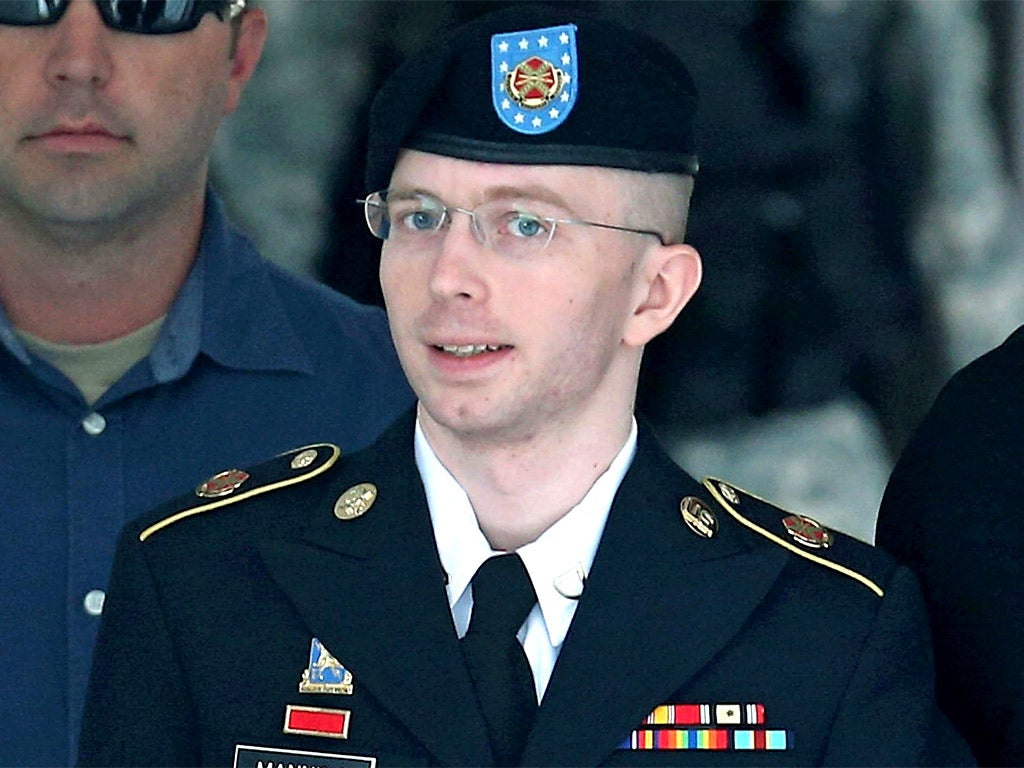Judge casts doubt on damage caused by whistleblower Bradley Manning’s US secret data leaks

Your support helps us to tell the story
From reproductive rights to climate change to Big Tech, The Independent is on the ground when the story is developing. Whether it's investigating the financials of Elon Musk's pro-Trump PAC or producing our latest documentary, 'The A Word', which shines a light on the American women fighting for reproductive rights, we know how important it is to parse out the facts from the messaging.
At such a critical moment in US history, we need reporters on the ground. Your donation allows us to keep sending journalists to speak to both sides of the story.
The Independent is trusted by Americans across the entire political spectrum. And unlike many other quality news outlets, we choose not to lock Americans out of our reporting and analysis with paywalls. We believe quality journalism should be available to everyone, paid for by those who can afford it.
Your support makes all the difference.A military judge has cast doubt on the scale of damage inflicted by Bradley Manning’s leaks of classified information, ruling that some US government evidence was inadmissible.
As she prepared to sentence Bradley Manning for passing secret information to the whistleblowing website WikiLeaks, Judge Denise Lind said she would only admit evidence of the “chilling effects” his actions have had on US diplomacy if those effects were observed directly after the information was made public.
The ruling in favour of the defence came in the second week of the sentencing phase of the trial. Last month, Manning was found guilty on 20 counts, including six violations of the Espionage Act, five counts of federal theft and a charge of federal computer fraud for leaking hundreds of thousands of cables and battleground reports after he was posted to Baghdad as an intelligence analyst in 2009.
On Tuesday, Judge Lind also accepted a defence motion to combine some of the guilty verdicts, lowering the maximum prison term from 136 years to 90. The defence had asked for it to be reduced to 80 years. The two decisions gave encouragement to the defence and to the legions of Manning supporters around the globe, offering hope that despite the many guilty verdicts delivered last month, Judge Lind will show more leniency in sentencing. Even so, the 25-year-old, from Crescent, Oklahoma, could still be behind bars for the rest of his life. The sentence is expected to be announced towards the end of this month.
As part of the ruling, Judge Lind threw out testimony given on Tuesday by Patrick Kennedy, an Under-Secretary of State, in which he said information published online more than two years ago, which was traced to Manning, continued to hurt US diplomatic efforts around the world. He said diplomats now felt they had to be more restrained in what they could write in a cable for fear that it might be leaked.
“The State Department has had situations in which individuals have felt they ‘don’t have the same ability to engage in the level of full and frank discussion’ prior to the disclosures,” Mr Kennedy told the court.
In a rare interview, Manning’s father, Brian, told CNN he still believed his son was innocent and that when he admitted to leaking documents as part of an effort to reach a partial plea deal last February, his son was merely “grandstanding”. He said he could not see how it would be possible for his son to upload such a quantity of secret data while on a US Army base with colleagues around him.
Judge Lind has also rejected a prosecution argument that the WikiLeaks saga was discouraging international human rights workers to come to the US for help in different parts of the world. She told the government the “chilling effects” testimony should be limited to the periods “directly following” the WikiLeaks releases or media accounts of them around the world.
Join our commenting forum
Join thought-provoking conversations, follow other Independent readers and see their replies
Comments